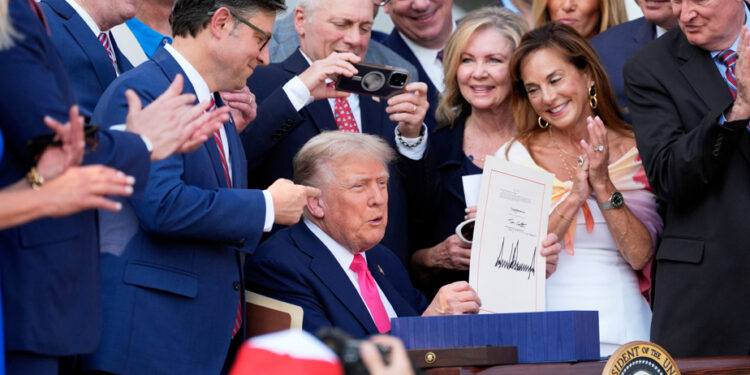(New York) The Declaration will be one of Donald Trump’s biggest exaggerations or falsehoods, who must be considered a champion in the matter.
“This is the most popular bill ever signed,” said the American president last Friday before promulgating his One Big Beautiful Bill Act (OBBBA), whose massive tax reductions will especially benefit the richest Americans and major cuts in social programs will strike the poorest Americans.
In fact, polls indicate that it is probably the least popular budgetary bill in American history. In mid-June, 59 % of respondents of a survey carried out on behalf of Fox News were opposed to it, against 38 % who were favorable.
However, among 10 polls conducted from May to July, this 38 % support represented a summit1.
“We never see such bad figures,” said Harry Enen, specialist in CNN data last Monday.
I tried to consult the history books to find out if there was another legislative text on the point of being adopted which was as unpopular as it, but I found none.
Harry Enen, CNN data specialist
Some of his criticisms have described the budgetary law wanted by Donald Trump as a delay bomb that threatens finances in the United States. According to estimates, it will add between 3300 billion and 5400 billion to an already pharaonic national debt.
But, given its current unpopularity, could this law also be an electoral delay bomb for 2026 or 2028?
The answer will partly resolve a paradox. Because, just as unpopular as it is, the budgetary law of Donald Trump is still unknown by a good part of the Americans.
Its electoral impact will therefore depend on the story which will be imposed in the minds of voters concerning its advantages and disadvantages.
Vulnerable Republicans
For 2026, the issue will be the control not only of the House of Representatives, but also of the Senate.
Even before the adoption of the OBBBA, the thin majority of Republicans in the House were in danger, if only because of the tradition that sees the White House party losing seats during the mid-term elections.
To this is now added the Obbba factor. About fifteen republican representatives, elected in pivotal districts, have themselves expressed their opposition to the cuts in the Medicaid health insurance program.
“The protection of Medicaid is essential for the vulnerable voters that we were elected to represent,” they wrote in a letter addressed to the Republican leaders of the Congress. “Consequently, we cannot support a final bill which threatens access to coverage or which jeopardizes the stability of our hospitals and our suppliers. »»
Photo Alex Wroblewski, Agence France-Presse Archives
Only two Republican representatives, Brian K. Fitzpatrick (Pennsylvania) and Thomas Massie (Kentucky), voted against the Obbba.
The signatories all ended up supporting a bill which could deprive up to 17 million Americans of their medical coverage, according to an analysis of the budget office of the congress.
The Republicans still tried to protect their rear. They notably postponed the entry into force of the MEDICAID program to 2027, after the mid-term elections.
They also provided replicas to certain criticisms of the Democrats. They notably claimed that the only Americans likely to lose the protection of Medicaid will be those, among some valid adults aged 18 to 64, who will refuse to work, to undergo vocational training, to go to school or to volunteer.
Vulnerable Republicans of California, New York State and New Jersey also welcomed an important victory for the taxpayers heavily taxed from their constituencies. They managed to increase $ 10,000 to $ 40,000 the ceiling of the federal deduction of local and state taxes.
Dream
But American voters do not always wait for the entry into force of a law to punish those who adopted it. During the 2010 mid-term elections, they imposed a beating on the party of Barack Obama, a few months after the Obamacare promulgation. This law on health insurance, described as a socialist horror by the Republicans, became popular a few years after its entry into force in January 2014.
Nevertheless: in November 2010, the Democrats underwent a loss of 63 seats in the Chamber and 7 seats in the Senate.
Losses of this magnitude are unthinkable today. But Democrats no longer just dream of gaining control of the House in November 2026.
“(This bill) can actually kill the republican majority in the Senate. I see it for the first time, ”said on X Neera Tanden, ex-collaborator of Joe Biden, after the adoption of the Obbba by the upper Congress Chamber.
Such a scenario remains improbable. To be convinced, it is enough to mention the States where the Democrats have the best chance of winning the four seats they need to delight the Republicans their majority: Maine, Caroline du Nord, Iowa, Nebraska, Alaska and Ohio.
In other words, Neera Tanden dreams in color. But the arrival of Elon Musk’s party on the electoral chessboard, if it materializes, could benefit the Democrats in certain states.
And the remarks made by certain Republicans against the OBBBA should provide Democratic candidates some of their best arguments in 2026.
“What will I say to 663,000 people (from North Carolina) in two or three years, when President Trump broke his promise by pushing them out of the Medicaid program because the funding is no longer there?” “Asked the Republican senator from Caroline du Nord Thom Tillis, who opposed the Obbba before announcing that he would not defend his seat in 2026.
This question is a time bomb in itself whose effects could be felt until 2028.
1. Consult a report of the 10 surveys on the OBBBA (in English)



